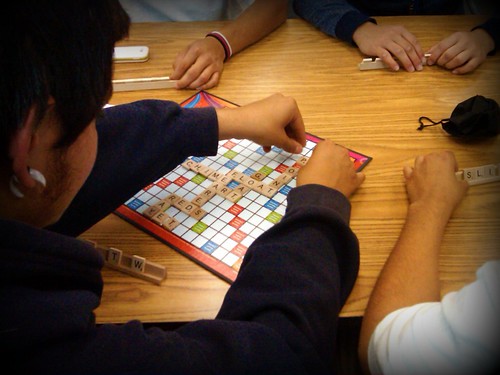
My high school students have fallen in love with Scrabble.
My high school students, although in a creative writing class, are reluctant writers. They are not lovers of language. Some of them could not spell their way through a ransom note. Yet, they beg to play Scrabble. It is the most amazing thing to me because last year when I tried to introduce Scrabble to students at this school, they just didn't get it.
It started as a Friday activity, when classes are only 30 minutes, and then we found ourselves to the time of the year when the students--they are seniors, afterall--are just DONE. And they just want to play Scrabble. And for some reason, I was okay with that. Honestly, I was okay because I'm tapped out in finding writing topics and projects for this fickle bunch.
Anyway...
Call it word play. Vocabulary development. A cop out. Whatever. I can spin it so we can do it.
They didn't just play regular Scrabble during out little word play unit. I taught them some variations on the game, and they found some of them rather challenging.
Theme Scrabble was the first one we tried. I told students to play the game just as they normally would but to try to build words that were school-related. That night I gave extra credit to students each time they built a word related to the theme. The students were excited to earn extra credit, so that was a big motivator.
Proper Scrabble should have quenched their desires to always use proper nouns, as that's ALL they could use when playing this version. Of course, it proved to be difficult, but that's the point. Think, little darlings, think!
Anagrams or Clabbers was a bit hard for them to catch onto at first. Actually, they didn't use true anagrams when coming up with their plays. They were able to simply put down the word in any order that they wanted. This made them think about strategy a bit because they were able to put down high-point tiles on the bonus spaces.
Tonica was interesting because all the tiles were divided up at the beginning of the game, and those were the tiles they had to work with during the whole game. I told students that they could still get the "bingo" for having words with 7 or more letters, so of course, the scores were high for the game. I was interested in seeing the various strategies. One group just played as usual, but another team spent most of their time with their noses in dictionaries trying to come up with the longest words possible. Nose in a dictionary? Seriously. Wow.
After a few days of this, of course, the most natural thing for me to do was to ask each team to make up their own variation of the Scrabble game and then give it to another team to play. The day we played the student-made variations, I only had students enough for 2 teams, so I am not sure what all the game variation ended up being, but here are some of their ideas:
- all tiles passed out, and the person who has a word with a z ready to play starts the game
- players have enough tiles to fill the tray at all times
- all words put down can only be animals or colors
- all words can only be placed backwards on the board
- drink theme--drink names get 50 extra points (I was fearful of this risky topic, but surprisingly, they did not pervert the game at all.)
- bonus point squares are only good if the word is a drink, otherwise, points are normal
- a player can trade hands (or rack of tiles) with another player at any time if an agreement is reached
I know I don't have much time to play such games in my regular English classes, so this is really only a wacky kind of thing I could have some leeway with in creative writing. I've just been in awe how attentive my students have been--not to mention how much thinking they've actually been doing in the name of playing games.
No comments:
Post a Comment